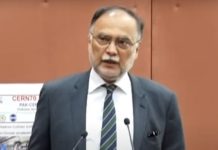By Ali Imran
ISLAMABAD: United Nations Food and Agriculture (FAO), here on Tuesday marked the official launch of the Digital Agriculture Consortium (DAC), a pivotal step in transforming Pakistan’s agriculture through digital means.
The event, part of the PDAC project “Technical Support for the Establishment of Pakistan Digital Agriculture Consortium,” was backed by the Food and Agriculture Organization and the Ministry of National Food Security and Research (MNFSR). It brought together a wide range of participants, including digital agriculture companies, mechanization service providers, digital service providers, financial representatives, policymakers, and development partners.
Government bodies such as the Ministry of Information Technology & Telecommunication and Land Information & Management System also attended.
The event showcased various digital agriculture products and services, giving attendees a hands-on look at the latest advancements, from precision agriculture tools to smart farming technologies. The event covered key areas like digital track and traceability systems and land information management, demonstrating how these technologies can improve agricultural productivity and efficiency. Panel discussions featured industry experts and thought leaders discussing topics like bridging gaps in ag-tech solutions and post-harvest success.
The DAC also began enrolling stakeholders into the consortium, aiming to integrate key players from government, private sector, academic institutions, and agri-tech companies into a unified platform. This broad coalition is committed to advancing digital agriculture across Pakistan.
The primary goal of the DAC launch was to highlight the consortium’s main objectives: establishing robust governance structures, developing a unified digital platform, and formulating comprehensive digital strategies. The event identified key industry challenges and proposed effective solutions to address them.
The DAC aims to make Pakistan’s agriculture sector more productive, efficient, and sustainable by integrating advanced technologies.
This includes making farming more consistent and resource-effective, benefiting farmers and society at large.
The role of the private sector in expanding Pakistan’s digital agriculture was emphasized, highlighting the need for systematic mainstreaming and coordination of digital services.
The successful launch of the DAC sets the stage for significant advancements in digital agriculture in Pakistan.
By fostering collaboration, knowledge exchange, and strategic planning, the DAC is well-positioned to drive the digital transformation of agriculture, enhancing productivity, efficiency, and sustainability across the country.





